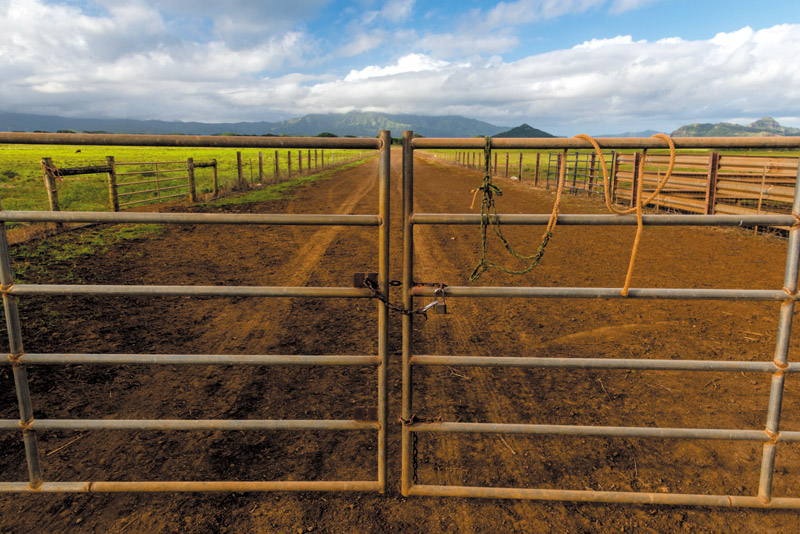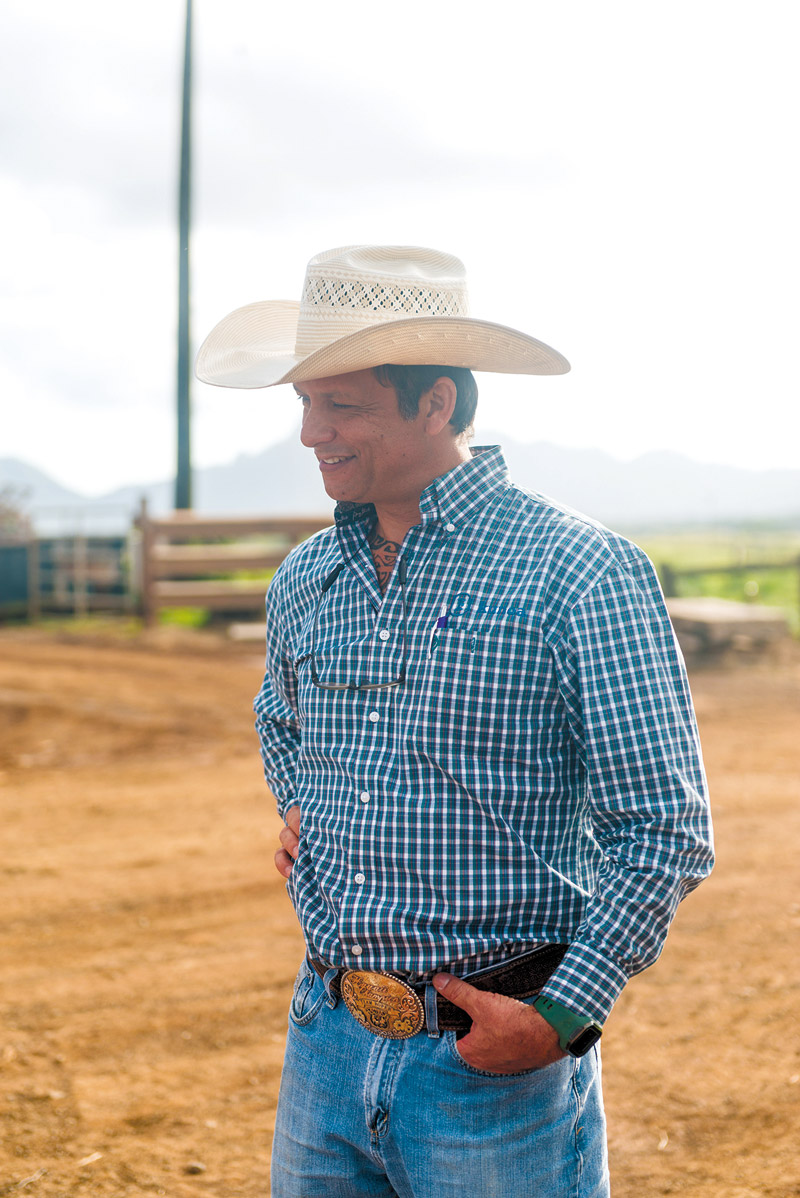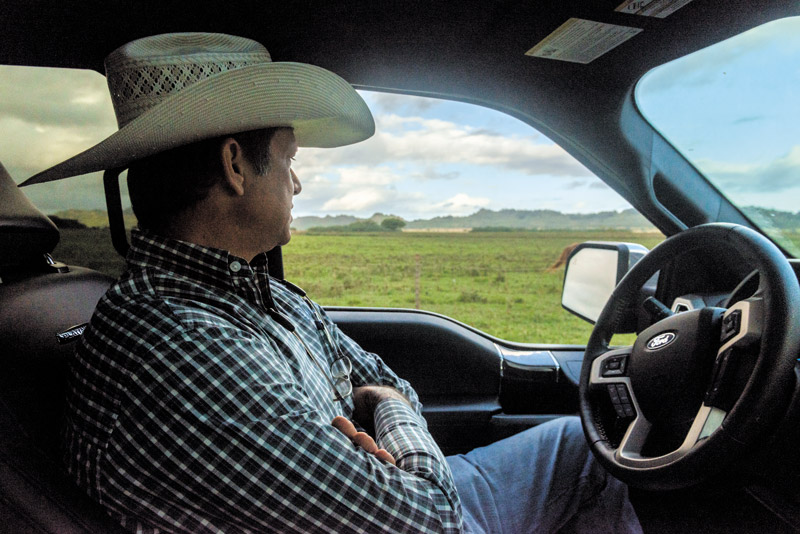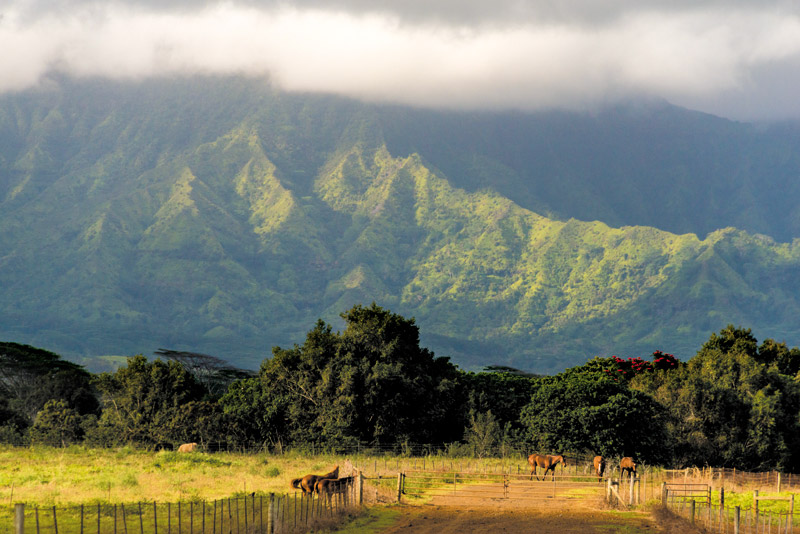‘Moo’-Vin’ Forward
Bobby Farias, co-founder of Kunoa Cattle Co., is committed to making local beef sustainable for consumers and ranchers alike.
Bobby Farias calls to a herd of cattle that drifts cautiously toward him on a sunny afternoon in Līhu‘e. He’s standing in one of the many pastures managed by Kunoa Cattle Co., which he co-founded in 2014. Though the enterprise is still fresh, Farias has cared for cattle for decades and is no stranger to their ways. He explains that they have an innate curiosity, as their big, brown eyes peer at him with interest.
Farias is a third-generation paniolo (cowboy), and while he drifted toward a different career path as a property manager for about two decades, he found his way back to his livestock roots. His family members were not only ranchers, but they also owned and operated Farias Ranch and Feed Supply for more than three decades.
“If you’re born to be in this, you probably will find it at some point and you’ll probably never leave it – good or bad,” says Farias, who is also a champion team roper.
He found it again when his son, Robby John, who is now a pro rodeo competitor on the Mainland, begged him to teach him the tricks of the trade. At the time, Farias had hung up his cowboy hat, but by the early 2000s, he couldn’t help but get roped back in after acquiring land in Kapa‘a and setting up an arena to train his son for competitions.
“Pretty soon we were a 1,000 head into it with 20 horses,” say Farias. And that’s how his current cattle operation initially kicked off. It was also the moment he finally admitted he was back in the ranching business.
Now, the operation he co-founded with Jack Beut-tell, which has since been named Kunoa Cattle Co., includes more than 4,000 acres of land on Kaua‘i and O‘ahu, with some 2,000 head of cattle. One aspect that’s helped his business reach such great heights happened after Farias says he made a decision to “get off the ranch to go sell our wares.”

Kunoa Cattle Co. raises more than 2,000 head of cattle on more than 4,000 acres of land on Kaua‘i and O‘ahu.
While he understood the process of raising cattle, the feedback from customers regarding the product never trickled back to him or other ranchers, so he was determined to close that gap. He realized the “producer” or rancher went through three years of work raising cattle to a “finished market animal” but never knew what the final pay-back would be.
“He or she takes all the risks, and they have no idea what the outcome’s going to be,” Farias says. “We decided that if we’re going to stay in ranching, we’ve got to be part of the end product so that we can be part of the decision-making. We are the sellers, we have to go find the buyers.”
So, Farias hit the road and became his own broker, and now, a decade later, Kunoa Cattle Co., which primarily distributes its meat to O‘ahu restaurants but will soon expand to Kaua‘i, still serves as a broker for other ranchers.
“We want those ranchers to stay in business and work really hard to try and find the highest money per pound for their calves and get them to the right buyer,” he says.
He has made it a mission to aggregate large quantities of calves from other ranchers, who may not be able to take them all the way to finish due to a number of factors like drought. He hosts them on land in Līhu‘e so that they can be finished in Hawai‘i or until they are ready to continue to the Mainland.
“And make better money for the entire community,” he says.
Another way Kunoa Cattle Co. has carried on Farias’ mission to help ranchers stay afloat is by providing processing services at their USDA-inspected meat processing facility on O‘ahu, which the business purchased in 2016. The final product is then marketed through various channels like grocery stores and restaurants. The facility processes more than 100 animals per month, but is capable of handling hundreds more. Achieving this would help create an all-around more sustainable food industry, as Hawai‘i sorely lacks meat-processing infrastructure.
“We need five more Kunoas,” says Farias.
Right now, even if all Hawai‘i’s cattle stayed in the state until maturity and were processed locally, it would only account for a small percentage of the total meat consumption in the islands. Currently, tens of thousands of calves are shipped to California or Texas each year, where they mature and are harvested and sent back — even though there’s no way of knowing for certain if the meat that’s returned is from the same animals. With more than a million fallow acres in the state, however, Farias says there’s plenty of room for alternative possibilities, and Kunoa Cattle Co. wants to help pick up those reins.
“I feel like if we don’t put cattle on it, somebody else is going to do something with it. And nothing should sit idle; that’s just lazy,” says Farias. “If all the ranchers could grow by just 5 percent each year, then we maybe could really take a big bite out of that red protein food security in Hawai‘i. This is all about building more food sustainability.”
Though it takes a commitment to make that happen — only four Kunoa Cattle Co. cowboys run nearly 3,000 head of cattle on Kaua‘i and work long hours, seven days a week — Farias believes the work is vital to have healthy cattle living stress-free lives grazing on grass in mild weather conditions.
“This is utopia,” says Farias, who has also worked in the ag industry on the Mainland, where extreme heat and cold climates wreak havoc on the animals. “I know in my heart these cattle are better for it, and we’re better for it to have them for consumption because they just don’t have to go through such miserable conditions.”
It’s easy to tell that Farias is ardent about keeping food on the island. He’s also committed to caring for cattle in the best way possible, as well as his hard-working, dedicated paniolo comrades — a mission he’s able to make happen through Kunoa Cattle Co.








